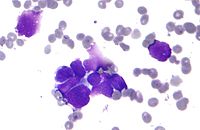
Photo from wikipedia
Background Kidney renal clear cell carcinoma (KIRC) is a fatal malignancy of the urinary system. Autophagy is implicated in KIRC occurrence and development. Here, we evaluated the prognostic value of… Click to show full abstract
Background Kidney renal clear cell carcinoma (KIRC) is a fatal malignancy of the urinary system. Autophagy is implicated in KIRC occurrence and development. Here, we evaluated the prognostic value of autophagy-related genes (ARGs) in kidney renal clear cell carcinoma. Materials and Methods We analyzed RNA sequencing and clinical KIRC patient data obtained from TCGA and ICGC to develop an ARG prognostic signature. Differentially expressed ARGs were further evaluated by functional assessment and bioinformatic analysis. Next, ARG score was determined in 215 KIRC patients using univariable Cox and LASSO regression analyses. An ARG nomogram was built based on multivariable Cox analysis. The prognosis nomogram model based on the ARG signatures and clinicopathological information was evaluated for discrimination, calibration, and clinical usefulness. Results A total of 47 differentially expressed ARGs were identified. Of these, 8 candidates that significantly correlated with KIRC overall survival were subjected to LASSO analysis and an ARG score built. Functional enrichment and bioinformatic analysis were used to reveal the differentially expressed ARGs in cancer-related biological processes and pathways. Multivariate Cox analysis was used to integrate the ARG nomogram with the ARG signature and clinicopathological information. The nomogram exhibited proper calibration and discrimination (C-index = 0.75, AUC = >0.7). Decision curve analysis also showed that the nomogram was clinically useful. Conclusions KIRC patients and doctors could benefit from ARG nomogram use in clinical practice.
Journal Title: Journal of Oncology
Year Published: 2021
Link to full text (if available)
Share on Social Media: Sign Up to like & get
recommendations!